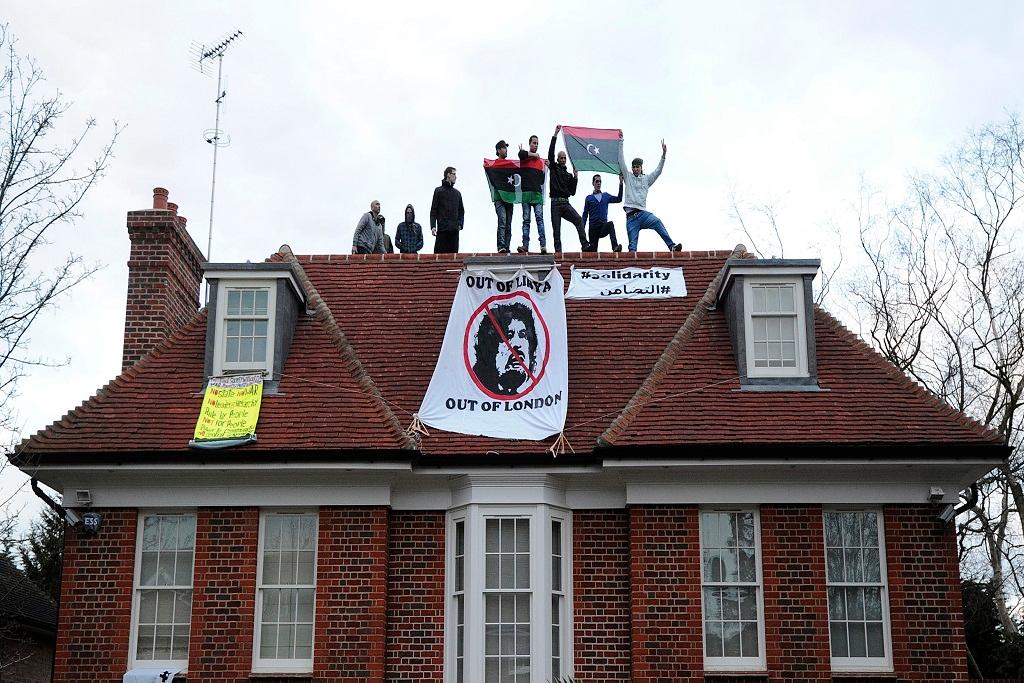Are London’s squatters out of control?
Squatters and demonstrators are pictured on the roof of a house belonging to Seif al-Islam, the son of Libyan dictator Moamer Kadhafi, in Hampstead, north London, on March 9, 2011. A government report estimates roughly 20,000 squatters occupying London homes today.
LONDON, UK — With rents here and across the UK at an all-time high, the UK media has painted a picture of a squatting epidemic, with homeowners under siege by opportunistic occupiers.
In August, a doctor and his pregnant wife found their newly-purchased 1 million pound ($1.6 million) north London home taken over by a group of squatters who refused to leave until the couple secured a court order.
The same month, a family of eight Romanians moved into a government employee’s east London home while she was away, trashing her belongings and causing 40,000 pounds in damages.
Residents of one northeast London community claim that a gang of roving squatters has occupied some 30 different homes in the area.
Even the infamous are not immune. In March, the lush London residence of Saif al-Islam Gaddafi, the late Libyan dictator’s son, was taken over by a group of squatters who claimed they were seizing the house on behalf of the Libyan people.
More on GlobalPost: Saif Gaddafi's London home taken by squatters
From landless peasants in medieval times to homeless Londoners seeking shelter after the Blitz, squatters in England have long enjoyed protection under some of the world’s most accomodating squatting laws. Though there is no hard evidence of a change in squatter numbers, the recent headlines have attracted public ire and lawmakers’ attention.
Parliament is now reviewing a bill that would make squatting a criminal offense in England and Wales, where is it currently only a civil matter. (It is already illegal in Scotland.)
The House of Lords will discuss the provision on squatting in early February. With their rights under siege, squatters are standing up to fight.
“People are being convinced that if they go to get a pint of milk there will be squatters in their kitchen,” said Rueben Taylor, campaigner for Squatters Action for Secure Homes, a squatters’ rights advocacy group. The proposed law, she said, is “unjust and unnecessary.”
There are an estimated 20,000 people squatting in England, according to a government estimate. They include homeless individuals, artists and young people seeking alternative communities, as well as Gypsies, Roma and Travellers (a nomadic group of Irish origin).
They benefit from a wide selection of vacant properties — there are 720,000 unoccupied houses in England, according to housing non-profit Empty Homes — and a legal and social environment that favors squatters’ rights. It’s generally legal to squat in a residential property as long as no one lives or intends to live there. If squatters don’t damage the buildings they occupy, there is often little that police, property owners or any other agency can do to evict them without a long and costly court process. After 12 years, the property legally becomes the squatter’s.
Squatting tips are readily available from organizations like the non-profit Advisory Service for Squatters, whose website counsels would-be squatters to send themselves mail and change the locks to bolster their claim to a property.
More on GlobalPost: Venezuela's squatter city
The proposed law would make it a crime to squat in any residential building, regardless of whether it is in current use. Proponents of the bill say that it will provide police and government agencies with much-needed tools to evict illegal occupiers.
“Those who enter and occupy a person’s property without permission cause untold misery, which is why the Government is determined to stamp out this distressing practice,” a Ministry of Justice spokesperson wrote in an email.
Chris Town, vice chair of the Residential Landlords Association, which supports the bill, said that two squatters occupied a one-bedroom apartment he owned in Leeds for nearly a month. Because he could not prove that they damaged the property when entering it or committed any other crime, police did not act, and the couple eventually left of their own accord, he said. “It was absolutely crazy, a crazy situation,” he recalled. “The law [needs] modernizing.”
Social welfare groups and pro-squat activists say that the government is capitalizing on a few aberrant cases to push through a law that unfairly targets the homeless, Travellers and other vulnerable people. They claim the new law ignores the fact that most squatters seek out clearly abandoned properties where they can live without notice.
More on GlobalPost: Occupy London protesters 'repossess' empty UBS bank
“In most cases people squat out of desperation — it is a last resort,” said Hannah Cornford of Homeless Link, a non-profit devoted to homeless issues, in an email. “The Government’s plan to criminalize squatting is likely to simply push vulnerable people onto the streets.”
Most squatters don’t want a hostile confrontation with a displaced resident, said Taylor, who said she has squatted several times in different London locations and found it “hard work.” They just want a place to sleep.
“As more people are facing eviction and facing homelessness, more people will turn to these kinds of measures to keep a roof over their heads,” she said.
The story you just read is accessible and free to all because thousands of listeners and readers contribute to our nonprofit newsroom. We go deep to bring you the human-centered international reporting that you know you can trust. To do this work and to do it well, we rely on the support of our listeners. If you appreciated our coverage this year, if there was a story that made you pause or a song that moved you, would you consider making a gift to sustain our work through 2024 and beyond?
